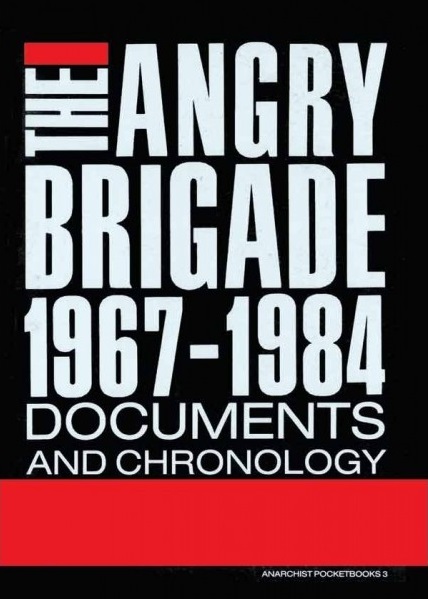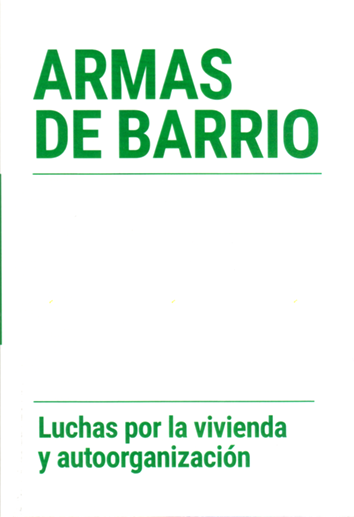-
 <p><em>Angry Brigade, Documents and Chronology</em> shows some extent of the armed struggle that was carried out in Britain in the late sixties and early seventies, reproposing the validity of armed attack against capital in all its forms.</p> <p>«By their actions the Angry Brigade also became a part of that spectacle, but a part that took form in order to contribute to its destruction. Their actions as presented here find a place therefore not as some old commodity to be taken out and dusted, then put back on the shelf like a relic that belongs to the past. The work they carried out —and which five libertarians paid for in heavy prison sentences— is a contribution to the ongoing struggle which is changing form as the strategies of capital change in order for it to restructure and preserve itself. A critical evaluation of the Angry Brigade must therefore take place elsewhere than on the sterile pages of this pamphlet. It must take place in the active considerations of a movement that has a task to fulfil, and that does not take heed of the condemnation and defamation by those whose ultimate aim is to protect themselves. Many problems are raised by a rereading of the actions and experiences of the Angry Brigade —clandestinity or not, symbolic action or direct attack, anonymous actions or the use of communiques to be transmitted by the media— to name but a few. The pages that follow help to highlight these questions, whose solution will only be found in the concrete field of the struggle.» <br /> —Jean Weir</p>
<p><em>Angry Brigade, Documents and Chronology</em> shows some extent of the armed struggle that was carried out in Britain in the late sixties and early seventies, reproposing the validity of armed attack against capital in all its forms.</p> <p>«By their actions the Angry Brigade also became a part of that spectacle, but a part that took form in order to contribute to its destruction. Their actions as presented here find a place therefore not as some old commodity to be taken out and dusted, then put back on the shelf like a relic that belongs to the past. The work they carried out —and which five libertarians paid for in heavy prison sentences— is a contribution to the ongoing struggle which is changing form as the strategies of capital change in order for it to restructure and preserve itself. A critical evaluation of the Angry Brigade must therefore take place elsewhere than on the sterile pages of this pamphlet. It must take place in the active considerations of a movement that has a task to fulfil, and that does not take heed of the condemnation and defamation by those whose ultimate aim is to protect themselves. Many problems are raised by a rereading of the actions and experiences of the Angry Brigade —clandestinity or not, symbolic action or direct attack, anonymous actions or the use of communiques to be transmitted by the media— to name but a few. The pages that follow help to highlight these questions, whose solution will only be found in the concrete field of the struggle.» <br /> —Jean Weir</p> -
 <p><em>El dogma de la no-violencia</em> se pregunta, la no-violencia, que está en boca de todos, en los protocolos de mediación en la escuela, en la boca de los curas y de los políticos, en el mantra de la televisión o en las reuniones de militantes y activistas, esa no-violencia: ¿es eficaz? ¿es nuestra, la hemos escogido? ¿qué es al final la no-violencia? Desde el momento en que nuestros adversarios políticos defienden tan encarnizadamente la no-violencia, ésta se vuelve sospechosa. El libro parte de la experiencia de situaciones de lucha en la calle durante estos últimos años, en las cuales, por ejemplo, se aplicaba el argumento de la no-violencia para situaciones que eran en realidad solamente de pura debilidad. En el libro se recorre el espectro de la no-violencia, desde sus argumentos hasta su historia, pero igualmente a través de la más reciente historia de las luchas en Barcelona, para llevarnos a un lugar incómodo y difícil, podríamos decir incluso violento, en la medida en que el pensamiento verdadero no es la repetición de algo sabido sino una violencia que se hace sobre la realidad. Porque, donde nos lleva este libro es a la necesidad de tener que volver a pensar, en el interior de la relación de fuerzas elementales que nos constituye: ¿cómo nos defendemos y cómo podríamos defendernos?</p>
<p><em>El dogma de la no-violencia</em> se pregunta, la no-violencia, que está en boca de todos, en los protocolos de mediación en la escuela, en la boca de los curas y de los políticos, en el mantra de la televisión o en las reuniones de militantes y activistas, esa no-violencia: ¿es eficaz? ¿es nuestra, la hemos escogido? ¿qué es al final la no-violencia? Desde el momento en que nuestros adversarios políticos defienden tan encarnizadamente la no-violencia, ésta se vuelve sospechosa. El libro parte de la experiencia de situaciones de lucha en la calle durante estos últimos años, en las cuales, por ejemplo, se aplicaba el argumento de la no-violencia para situaciones que eran en realidad solamente de pura debilidad. En el libro se recorre el espectro de la no-violencia, desde sus argumentos hasta su historia, pero igualmente a través de la más reciente historia de las luchas en Barcelona, para llevarnos a un lugar incómodo y difícil, podríamos decir incluso violento, en la medida en que el pensamiento verdadero no es la repetición de algo sabido sino una violencia que se hace sobre la realidad. Porque, donde nos lleva este libro es a la necesidad de tener que volver a pensar, en el interior de la relación de fuerzas elementales que nos constituye: ¿cómo nos defendemos y cómo podríamos defendernos?</p>








